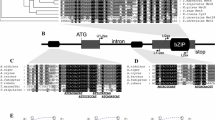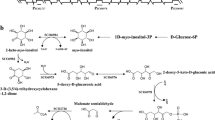Abstract.
sconC, which encodes a negative regulator of sulphur metabolism in Aspergillus nidulans was cloned, sequenced, and found to belong to the highly conserved family of SKP1 genes essential for many cell functions, including cell cycle regulation. The ORF of 722 bp, encoding a protein of 161 amino acids, is interrupted by four introns. There is a fifth intron (135 bp long) in the upstream untranslated sequence. Two point mutations in conserved regions were identified in the mutant alleles sconC3 and sconC1, which result in relief of sulphur metabolite repression. The SCONC protein contains the PEST sequence common for proteins that are subject to rapid turnover. Transformation of the sconC3 mutant with sconB + restores the wild-type phenotype. The sconB gene encodes a protein containing the F-box, a domain known to interact with Skp1 proteins. By analogy with other systems, it seems likely that the SCONC protein interacts with SCONB. sconC mRNA is present in the sconC3 and sconB2 mutants and the level of the sconC transcript seems not to be significantly regulated by supplementation of the medium with sulphur.
Similar content being viewed by others
Author information
Authors and Affiliations
Additional information
Electronic Publication
Rights and permissions
About this article
Cite this article
Piotrowska, M., Natorff, R. & Paszewski, A. sconC, a gene involved in the regulation of sulphur metabolism in Aspergillus nidulans, belongs to the SKP1 gene family. Mol Gen Genet 264, 276–282 (2000). https://doi.org/10.1007/s004380000319
Received:
Accepted:
Published:
Issue Date:
DOI: https://doi.org/10.1007/s004380000319




